|
|
|
Sort Order |
|
|
|
Items / Page
|
|
|
|
|
|
|
| Srl | Item |
| 1 |
ID:
139254
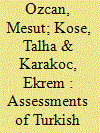

|
|
|
|
|
| Summary/Abstract |
Using original public-opinion polls and elite interviews conducted in 2012, this article analyzes the perceptions of Turkish foreign policy regarding the Arab Uprisings and the Syrian conflict in three Middle Eastern countries, Egypt, Iraq and Iran. It finds that ethnic, sectarian and religious groups in these three countries vary significantly in their views on Turkish foreign policy regarding both the Arab Uprisings and the Syrian conflict, although the same identity-related factors have a less salient effect at the elite level. The findings also suggest that the intersection of ethnicity and sect shapes people's attitudes toward Turkish foreign policy in Iran and Iraq. Sunnis, except for Kurds in Iran and Iraq, tend to have a positive view of Turkish foreign policy, while Shia Turkomans in Iraq tend to have a negative one.
|
|
|
|
|
|
|
|
|
|
|
|
|
|
|
|
| 2 |
ID:
127189
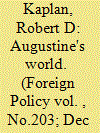

|
|
|
| 3 |
ID:
142732
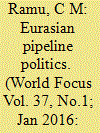

|
|
|
|
|
| Summary/Abstract |
The prolonged turmoil in Syria has several overtones, interpreted through varying dimensions that are mutually overlapping – but also disparate. What is often less discussed is the relevance of pipeline geopolitics, in conflagrating a conflict that sparked up as a mere civil war, just like any other anti-establishment protest across the rest of the Arab world. Notably, the argument over two major proposed pipeline projects is reflected in the continuing carnage engulfing Syria. These are the proposed Iran-Iraq-Syria gas pipeline and the Qatar-Saudi Arabia-Jordan-Syria gas pipeline respectively. The former is often called the Islamic Pipeline.
|
|
|
|
|
|
|
|
|
|
|
|
|
|
|
|
| 4 |
ID:
159976
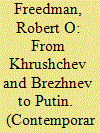

|
|
|
|
|
| Summary/Abstract |
Russian under President Vladimir Putin has established a strong presence in the Middle East. In fact, in 2017, Russian involvement in the regional affairs is more pronounced. Putin has done his utmost to restore Russia’s prestige in the region and has been successful to an extent. Russia though for a brief period lost out to the USA, especially in the case of Iraq and Libya but its decisive intervention in Syria has changed the dynamics. If one compares the policies followed by the Soviet Union in the Middle East during the reigns of Nikita Khrushchev and Leonid Brezhnev to the present situation some interesting parallels can be drawn. However, it should be noted that the goals and policies pursued by Putin are entirely different. But in comparing the position of Russia in the Middle East under Putin to the Soviet position in the region under Khrushchev and Brezhnev is much stronger.
|
|
|
|
|
|
|
|
|
|
|
|
|
|
|
|
| 5 |
ID:
123830
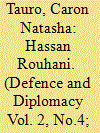

|
|
|
| 6 |
ID:
141559
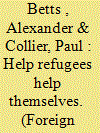

|
|
|
|
|
| Summary/Abstract |
There are now some 60 million displaced people around the world, more than at any time since World War II. The Syrian crisis alone, which has created the largest refugee shock of the era, has displaced some ten million people, around four million of them across international borders. In recent months, Western attention has focused almost exclusively on the flood of these refugees to Europe. Yet most of the Syrian refugees have been taken in not by Western countries but by Syria’s neighboring states: Jordan, Lebanon, and Turkey, whose capacity has been overwhelmed. Lebanon, with a population of around four million and a territory smaller than Maryland, is hosting over a million Syrian refugees. Young people are overrepresented in the refugee population, so that more than half of the school-aged children in Lebanon are now Syrian.
|
|
|
|
|
|
|
|
|
|
|
|
|
|
|
|
| 7 |
ID:
117795
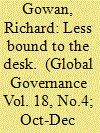

|
|
|
|
|
| Publication |
2012.
|
| Summary/Abstract |
WHAT SORT OF DIPLOMATIC STRATEGIST IS BAN KI-MOON? SINCE BAN TOOK
office as Secretary-General of the United Nationsin 2007, there has been a
great deal of discussion about his personal diplomatic style. Until the Arab
Spring, he was typically characterized as an archetypal (though not always
effective) quiet diplomat. In January 2011, Human Rights Watch accused
Ban of having an "undue faith in his professed ability to convince by private persuasion" when dealing with repressive governments in cases such
as Myanmar, Sudan, and Sri Lanka.
1
As I argued in a previous article for
Global Governance, Ban's belief in diplomacy meant that he took too little
interest in peacekeeping during his first term leading the UN.
2
Since the
beginning of the Arab Spring, however, Ban appears to have lost some of
hisfaith in diplomatic niceties. He spoke out early in favor of the protestors
in Egypt, became a consistent supporter of military action in Libya, and
publicly condemned the Syrian regime's violence against civilians as early
as May 2011.
3
Asthe Syrian crisis deteriorated in 2012, Ban appointed first
his predecessor, Kofi Annan, and later the stalwart UN mediator Lakhdar
Brahimi as envoys to Damascus but repeatedly escalated his own criticism
of President Bashar Al-Assad.
|
|
|
|
|
|
|
|
|
|
|
|
|
|
|
|
| 8 |
ID:
149445
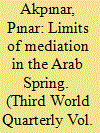

|
|
|
|
|
| Summary/Abstract |
This article investigates the limits of mediation during the Arab Spring by focusing on the case of Syria. It examines international mediation attempts by states, non-governmental organisation, and regional and international organisations. Drawing largely on Bercovitch and Gartner’s framework of mediation outcomes, the study suggests that the directive strategy applied by Staffan de Mistura through the United Nations–Arab League joint effort has achieved the closest outcome towards a full settlement. Mediation in the Syrian crisis has been limited by disagreement among key actors, lack of commitment and of coordinated efforts, questions of representation and legitimacy, and lack of neutrality and of inclusiveness. Despite its limits, mediation has been able to achieve important gains such as the longest and broadest ceasefire, access to the majority of besieged areas, considerable de-escalation of violence, commitment among key actors towards a resolution, and resolution of incidents of hostage crises. Despite its limits, mediation is likely to play an important role vis-à-vis the Arab Spring.
|
|
|
|
|
|
|
|
|
|
|
|
|
|
|
|
| 9 |
ID:
133773
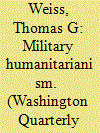

|
|
|
|
|
| Publication |
2014.
|
| Summary/Abstract |
Pundits claim that the war in Syria has sounded the death knell for humanitarian intervention and the Responsibility to Protect (R2P)-resquiescat in pace, according to David Rieff.1 By failing to intercede in that country's brutal civil war, many believe the international community effectively turned its back on an important emerging international norm, one that over 150 heads of state endorsed at the UN's 2005 World Summit.2
|
|
|
|
|
|
|
|
|
|
|
|
|
|
|
|
| 10 |
ID:
131840
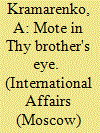

|
|
|
|
|
| Publication |
2014.
|
| Summary/Abstract |
Mr. Sestanovich makes clear his reason for this prediction, i.e. he doesn't like Russian diplomacy's success in turning things around in international community's response to the Syrian crisis. He does omit, however, a few facts of real consequence. Syria's chemical disarmament under UNSC Resolution 2118, indeed, represents a common denominator for all, including Russia and the U.S. But we didn't impose it on our partners. What we did is called providing leadership when our partners were confronted with impossible dilemmas. Britain resolved its own on August 29 through a vote of Parliament. The Obama administration faced a similar prospect in Congress. What is important is that the legislators of both countries reflected the prevailing mood of their public opinion. What is more, it was British Parliament that by its decision was the first to encourage President Obama to go to Congress on Syria, which ultimately led to UNSC unity.
|
|
|
|
|
|
|
|
|
|
|
|
|
|
|
|
| 11 |
ID:
140322
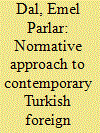

|
|
|
|
|
| Summary/Abstract |
This study explores the cosmopolitanism–communitarianism divide in normative international relations (IR) theory with a special focus on the apparent increasing weight of ethics and morality in Turkish foreign policy. First, it outlines the current debates in normative IR theory with a special focus on the divide between cosmopolitanism and communitarianism. Second, it asks whether Turkey’s foreign policy tradition, both in its discourse and its ethics, leans more toward cosmopolitanism or communitarianism. Then, it examines the slow rise of cosmopolitanism in Turkish foreign policy in the 2000s, with particular reference to the ruling political party in Turkey, the AKP (the Justice and Development Party). Finally, it examines the cosmopolitan/communitarian dilemma that the AKP government faces in the context of the Arab Spring, and specifically the Syrian civil war.
|
|
|
|
|
|
|
|
|
|
|
|
|
|
|
|
| 12 |
ID:
117791
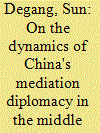

|
|
|
| 13 |
ID:
169568
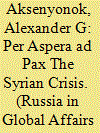

|
|
|
| 14 |
ID:
115600
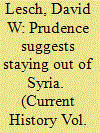

|
|
|
|
|
| Publication |
2012.
|
| Summary/Abstract |
We have learned time and again in history that arming opposition forces, while improving their chances in the near term, can militarize and divide a society in ways detrimental to its recovery.
|
|
|
|
|
|
|
|
|
|
|
|
|
|
|
|
| 15 |
ID:
174372
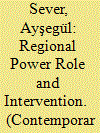

|
|
|
|
|
| Summary/Abstract |
The article elaborates how Turkey’s relations with Syria, which have been pursued by varying foreign policy instruments and conduct, have greatly affected Turkey’s standing on the Middle East during the 2000s. By employing the relevant concepts, “regional power” and “third party intervention” in the literature, the article aims to explain the changes caused by the Syrian conflict in the AKP’s (Adalet ve Kalkınma Partisi—the Justice and Development Party) foreign policy in a better frame. After the Syrian conflict, Turkey’s increasing intervention in Syria including use of force resulted in a new power projection other than soft power in its regional relations. Neighboring a civil war state caused Ankara to organize its relations with Syria and the Middle East in a new context which requires new mechanisms, new partnerships, and new interpretations in the face of rising nongovernmental armed groups, refugee flows, changing regional alignments, and diverging interests with its major Western allies.
|
|
|
|
|
|
|
|
|
|
|
|
|
|
|
|
| 16 |
ID:
123980
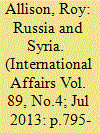

|
|
|
|
|
| Publication |
2013.
|
| Summary/Abstract |
This article explores explanations of Russia's unyielding alignment with the Syrian regime of Bashar al-Assad since the Syrian crisis erupted in the spring of 2011.
Russia has provided a diplomatic shield for Damascus in the UN Security Council and has continued to supply it with modern arms. Putin's resistance to any scenario of western-led intervention in Syria, on the model of the Libya campaign, in itself does not explain Russian policy. For this we need to analyse underlying Russian motives. The article argues that identity or solidarity between the Soviet Union/Russia and Syria has exerted little real influence, besides leaving some strategic nostalgia among Russian security policy-makers. Russian material interests in Syria are also overstated, although Russia still hopes to entrench itself in the regional politics of the Middle East.
Of more significance is the potential impact of the Syria crisis on the domestic political order of the Russian state. First, the nexus between regional spillover from Syria, Islamist networks and insurgency in the North Caucasus is a cause of concern-although the risk of 'blowback' to Russia is exaggerated. Second, Moscow rejects calls for the departure of Assad as another case of the western community imposing standards of political legitimacy on a 'sovereign state' to enforce regime change, with future implications for Russia or other authoritarian members of the Commonwealth of Independent States.
Russia may try to enshrine its influence in the Middle East through a peace process for Syria, but if Syria descends further into chaos western states may be able to achieve no more in practice than emergency coordination with Russia.
|
|
|
|
|
|
|
|
|
|
|
|
|
|
|
|
| 17 |
ID:
116652
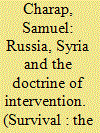

|
|
|
|
|
| Publication |
2013.
|
| Summary/Abstract |
Since the beginning of the Syrian crisis, there have been intermittent hopes that Moscow might play a constructive diplomatic role in resolving it. But the focus on Russia has been deeply misleading. Russia, for reasons that have little to do with Syria itself, was never going to be part of the solution to the crisis - at least on terms that the West and the Syrian opposition could accept. Further, Russia's centrality to international diplomacy on this issue and its seeming obstinacy expose deep flaws in post-Cold War Western doctrine on international intervention. Russia's centrality when it comes to Syria is more a function of those flaws than anything else.
|
|
|
|
|
|
|
|
|
|
|
|
|
|
|
|
| 18 |
ID:
162933
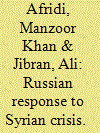

|
|
|
| 19 |
ID:
133740
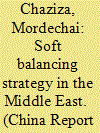

|
|
|
|
|
| Publication |
2014.
|
| Summary/Abstract |
Since the event popularly termed the 'Arab spring' and the changing balance of power in the Middle East, where China has economic interests, there has been a conspicuous balancing behaviour against the United States, the sole superpower. This article discusses whether the Chinese and Russian vetoes on Syria can be interpreted as a potential threat to counterbalance American moves in world politics, particularly in the Middle East. After abstaining on the no-fly zone over Libya, China vetoed thrice on the Syrian crisis. Beijing used its position to frame the agenda of the Security Council and to indirectly challenge US objectives in the region. China's diplomatic cooperation and coordination with Russia displays their mutual determination to check the US' moves in United Nations Security Council (UNSC) debates on the Syrian crisis. Yet, China is still very cautious about confronting the US directly or antagonising it, realising that it is still much weaker than Washington, and would gain nothing from such actions. Therefore, the Chinese strategy is to not engage in hard balancing behaviour, but in soft balancing which allows for the creation of strategic relationships through which hard balancing can occur in the future.
|
|
|
|
|
|
|
|
|
|
|
|
|
|
|
|
| 20 |
ID:
163110
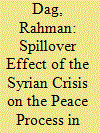

|
|
|
|
|
| Summary/Abstract |
The Kurdish question has been one of the most protracted issues in the political history of Turkey. Given such a long securitization of the Kurdish question, it almost came to an end due to the peace process initiated by the AK Party government and the imprisoned leader of the PKK, Abdullah Öcalan in 2013. Apparently it was not a solid process because it failed immediately after the June 2015 general election. There may have been many internal and external factors explaining the reason why it failed but this paper looks specifically at one of them: the influence of the Syrian crisis on the peace process in Turkey in light of spillover effects and spreading insurgency theories.
|
|
|
|
|
|
|
|
|
|
|
|
|
|
|
|
|
|
|
|
|